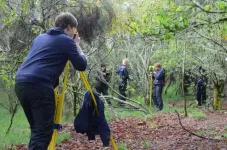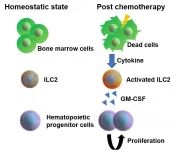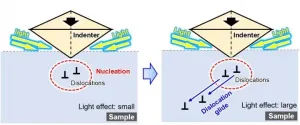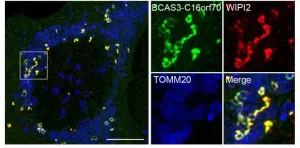Researchers find AI can predict new atrial fibrillation, stroke risk
Research team includes Geisinger, Tempus scientists
2021-03-05
(Press-News.org) DANVILLE, Pa. - A team of scientists from Geisinger and Tempus have found that artificial intelligence can predict risk of new atrial fibrillation (AF) and AF-related stroke.
Atrial fibrillation is the most common cardiac arrhythmia and is associated with numerous health risks, including stroke and death. The study, published in Circulation, used electrical signals from the heart--measured from a 12-lead electrocardiogram (ECG)--to identify patients who are likely to develop AF, including those at risk for AF-related stroke.
"Each year, over 300 million ECGs are performed in the U.S. to identify cardiac abnormalities within an episode of care. However, these tests cannot generally detect future potential for negative events like atrial fibrillation or stroke," said Joel Dudley, chief scientific officer at Tempus. "This critical work stems from our major investments in cardiology to generate algorithms that make existing cardiology tests, such as ECGs, smarter and capable of predicting future clinical events. Our goal is to enable clinicians to act earlier in the course of disease."
To develop their model, the team of data scientists and medical researchers used 1.6 million ECGs from 430,000 patients over 35 years of patient care at Geisinger. These data were used to train a deep neural network--a specialized class of artificial intelligence--to predict, among patients without a previous history of AF, who would develop AF within 12 months. The neural network performance exceeded that of current clinical models for predicting AF risk. Furthermore, 62% of patients without known AF who experienced an AF-related stroke within three years were identified as high risk by the model before the stroke occurred.
"Not only can we now predict who is at risk of developing atrial fibrillation, but this work shows that the high risk prediction precedes many AF-related strokes," said Brandon Fornwalt, M.D., Ph.D., co-senior author and chair of Geisinger's Department of Translational Data Science and Informatics. "With that kind of information, we can change the way these patients are screened and treated, potentially preventing such severe outcomes. This is huge for patients."
INFORMATION:
Geisinger and Tempus continue to work together to advance precision medicine using practical applications of artificial intelligence. Funding for this project was provided by Geisinger Clinic and Tempus.
Geisinger has an exciting research environment with more than 50 full-time research faculty and more than 30 clinician scientists. Areas of expertise include precision health, genomics, informatics, data science, implementation science, outcomes research, health services research, bioethics and clinical trials.
About Geisinger
Geisinger is committed to making better health easier for the more than 1 million people it serves. Founded more than 100 years ago by Abigail Geisinger, the system now includes nine hospital campuses, a 550,000-member health plan, two research centers and the Geisinger Commonwealth School of Medicine. With nearly 24,000 employees and more than 1,600 employed physicians, Geisinger boosts its hometown economies in Pennsylvania by billions of dollars annually. Learn more at geisinger.org or connect with us on Facebook, Instagram, LinkedIn and Twitter.
About Tempus
Tempus is a technology company advancing precision medicine through the practical application of artificial intelligence in healthcare. With one of the world's largest libraries of clinical and molecular data, and an operating system to make that data accessible and useful, Tempus enables physicians to make real-time, data-driven decisions to deliver personalized patient care and in parallel facilitates discovery, development and delivery of optimal therapeutics. The goal is for each patient to benefit from the treatment of others who came before by providing physicians with tools that learn as the company gathers more data. For more information, visit tempus.com.
ELSE PRESS RELEASES FROM THIS DATE:
2021-03-05
A new review of existing evidence proposes eight hallmarks of environmental exposures that chart the biological pathways through which pollutants contribute to disease: oxidative stress and inflammation, genomic alterations and mutations, epigenetic alterations, mitochondrial dysfunction, endocrine disruption, altered intercellular communication, altered microbiome communities, and impaired nervous system function.
The study by researchers at Columbia University Mailman School of Public Health, Ludwig Maximilian University, and Hasselt University is published in the journal Cell.
"Every day we learn ...
2021-03-05
Patients' electronic health records convey crucial information. The application of natural language processing techniques to these records may be an effective means of extracting information that may improve clinical decision making, clinical documentation and billing, disease prediction and the detection of adverse drug reactions. Adverse drug reactions are a major health problem, resulting in hospital re-admissions and even the death of thousands of patients. An automatic detection system can highlight said reactions in a document, summarise them and automatically report them.
In this context, the Basurto University Hospital and the Galdakao ...
2021-03-05
A monoclonal antibody "cocktail" developed at Vanderbilt University Medical Center (VUMC) to neutralize the COVID-19 virus is effective against all known strains, or variants, of the virus, according to a report published in the journal Nature Medicine.
That was one of the findings reported by a multi-institutional team led by researchers at Washington University School of Medicine in St. Louis.
In cell-culture studies, the researchers determined the ability of monoclonal antibodies as well as antibodies isolated from the "convalescent plasma" of previously infected people to neutralize highly transmissible variants of the SARS-CoV-2 virus that have arisen in the United Kingdom, South Africa, Brazil and elsewhere.
In general, most of the monoclonal antibodies that have ...
2021-03-05
Can Switzerland, as planned, cut its CO2 emissions to zero by 2050? In a study, researchers at the Paul Scherrer Institute PSI have investigated what measures would be necessary to achieve this reduction and how much it might cost per person.
In August 2019, the Swiss Federal Council decided on an ambitious target to limit climate change: From the year 2050 onward Switzerland should, on balance, discharge no further greenhouse gas emissions. With this commitment, Switzerland meets the internationally agreed goal of limiting global warming to a maximum of 1.5° C compared to the pre-industrial era.
Now a study by the Paul Scherrer Institute, ...
2021-03-05
Functioning ecosystems provide the basis for security, basic material needs, health, social interaction and individual liberty. This is how the Millennium Ecosystem Assessment 2005 described it, dividing ecosystem services into the following categories: The provisioning services; goods such as food, water, firewood and timber, the regulating services; pollination, water filtering function of the soil, flood and erosion protection, and the cultural services; recreation, places of inspiration, and education. Many of these services are indirectly and directly linked to the presence of species. For this reason, species conservation is often put forward as a measure for the conservation of vital natural services.
"However, most previous ...
2021-03-05
PHILADELPHIA - Intellectual disability puts individuals at higher risk of dying earlier in life than the general population, for a variety of medical and institutional reasons. A new study from Jefferson Health examined how the COVID-19 pandemic has affected this group, which makes up 1-3% of the US population. The study, published today in the New England Journal of Medicine (NEJM) Catalyst, found that intellectual disability was second only to older age as a risk factor for dying from COVID-19.
"The chances of dying from COVID-19 are higher for those with intellectual disability than they are for people with congestive heart failure, kidney disease or lung disease," says lead author Jonathan Gleason, MD, the James D. and Mary Jo Danella ...
2021-03-05
Osaka, Japan - Chemotherapy has a damaging effect on hematopoietic stem and progenitor cells (HSPCs) in bone marrow. However, once chemotherapy ends, HSPCs regenerate, a process that has remained unknown--until now. In a new study, researchers from Osaka University have identified the molecular mechanism by which HSPCs recover after injury.
HSPCs reside in the bone marrow and give rise to several types of blood cells, such as red blood cells (which carry oxygen), some white blood cells (which are important for the immune system) and platelets (which are necessary to stop bleeding). Because HSPCs constantly divide to generate new cells, they are particularly sensitive to injury induced by, for example, chemotherapy. ...
2021-03-05
Semiconductor materials play an indispensable role in our modern information-oriented society. For reliable performance of semiconductor devices, these materials need to have superior mechanical properties: they must be strong as well as resistant to fracture, despite being rich in nanoscale structures.
Recently, it has become increasingly clear that the optical environment affects the structural strength of semiconductor materials. The effect can be much more significant than expected, especially in light-sensitive semiconductors, and particularly since due to technological constraints ...
2021-03-05
Background: Although caregivers of patients with eating disorders usually experience a heavy caregiving burden, the effects of social support on caregivers of patients with eating disorders are unknown. This study aimed to investigate how social support for mothers who are caregivers of patients with an eating disorder improves the mothers' mental status and, consequently, the symptoms and status of the patients.
Methods: Fifty-seven pairs of participants were recruited from four family self-help groups and one university hospital in Japan. Recruitment was conducted from July 2017 to August 2018. Mothers were ...
2021-03-05
Autophagy is an intracellular degradation process of cytosolic materials and damaged organelles. Researchers at Ubiquitin Project of TMIMS have been studying the molecular mechanism of mitophagy, the selective autophagy process to eliminate damaged mitochondria. PINK1 (a serine/threonine kinase) and Parkin (a ubiquitin ligating enzyme: E3) work together to ubiquitylate the outer membrane proteins of damaged mitochondria, then ubiquitin chains are recognized as signals for autophagy degradation. Dysfunction of mitophagy causes a decrease in mitochondrial quality with overproduction of ROS, and is linked to neurodegenerative diseases like Parkinson's disease.
In Autophagy machinery, cellular components targeted for degradation are engulfed by phosphatidylinositol-3-phosphate (PI3P)-rich ...
LAST 30 PRESS RELEASES:
[Press-News.org] Researchers find AI can predict new atrial fibrillation, stroke risk
Research team includes Geisinger, Tempus scientists





